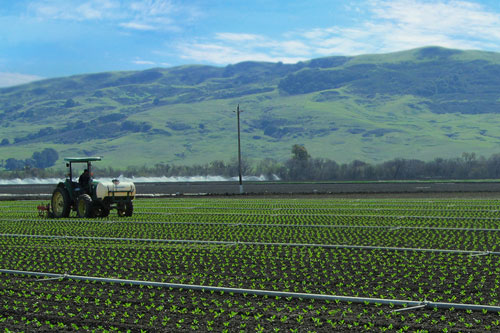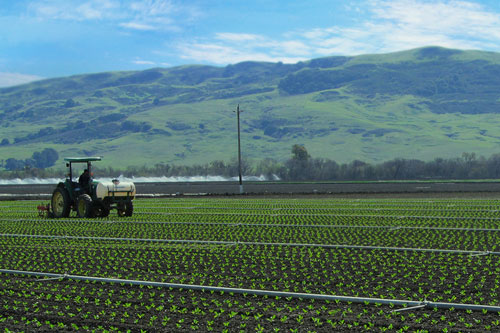
by Jessica Donnel,
Writer and Reporter at And NowUKnow
MCLEAN, VA – By now, the produce industry might be pretty well acquainted with our friends at Gladstone Land Corporation, a real estate investment trust (REIT), but perhaps not with how the company works to benefit farmers. Namely, allowing farmers to sell a farm to the company in a tax-free transaction and serving as a strategic partner with the farmer after the sale.
If you are like most farm owners, you likely farm the land yourself or lease it to another farmer. Either way your company works, farmland probably ties up a good deal of your money. Gladstone Land has an alternative.

States in which Gladstone Land Corporation holds farmland
As the company explained to me, Gladstone Land is set up as an umbrella partnership real estate investment trust (UPREIT) structure, meaning that the company holds its farm assets in its operating partnership. This allows Gladstone Land to acquire farmland from farm sellers in exchange for units of limited partnership interest in its operating partnership, or OP Units. In exchange for land, the seller can receive OP Units, which are then convertible to either cash or shares of Gladstone Land’s common stock, which is publicly traded on the NASDAQ Global Market, ticker symbol LAND, after a holding period of one year. What’s the benefit? The initial exchange transaction is tax-free to the seller—thus, any capital gains tax that otherwise would be payable if the seller of the farm was to sell the farmland for cash would be deferred.
If you own a farm in your name, the company assures the exchange is easy. Sign a purchase and sale agreement, choosing to sell for cash, OP Units, or a combination of the two. Next, the title company will handle the actual sale, transferring the farm in the government record books to the operating partnership, and giving you OP Units in the amount you agreed to receive. Again, the beauty of this exchange is that it is not a taxable event for the seller at the time of the transaction.

What else do sellers gain as part of this unique partnership with Gladstone Land?
Deferred Taxes
Yes, I’ve mentioned this before, but when a farm is sold for cash, capital gains taxes are generally due. If the farm is sold for OP Units, no capital gains taxes are due at the time of the sale.
Having a Real Estate Partner
Gladstone Land becomes your real estate or farmland partner, meaning it wants to keep farmers on the same land for as long as they want to farm it—a big advantage for land owners who want to continue to harvest.
Adding More Land and Acreage for You to Farm
With Gladstone Land as your real estate partner, if you wish to purchase new farmland, you do not have to buy it yourself. The company will buy the farm for you and rent it to you, meaning with just an additional lease, you can now farm additional land without the obligation to invest further.
Flexibility: Sell or Keep OP Units after One Year
Converting OP Units to cash or liquid common stock of Gladstone Land can be a simple solution for those who wish to avoid the hassle of selling a portion of their farm. If you have an emergency, the liquid investment can quickly provide extra cash. Furthermore, you are allowed to select when shares are converted or sold, and thus when the taxes are incurred.
No Mortgage
Your mortgage on the farm has gone away, and you no longer have a personal guarantee on the mortgage. This can be a significant relief to you and your family.
Diversification of Assets
Rather than holding just one farm, an investment in Gladstone Land gives you an interest in a diversified portfolio of properties throughout the U.S. in commonality with all of the other public stockholders of the company. This provides you with a diversified holding, avoiding that “all your eggs in one basket” problem.
Want to learn more details about selling farmland to Gladstone? Visit ir.gladstoneland.com.

